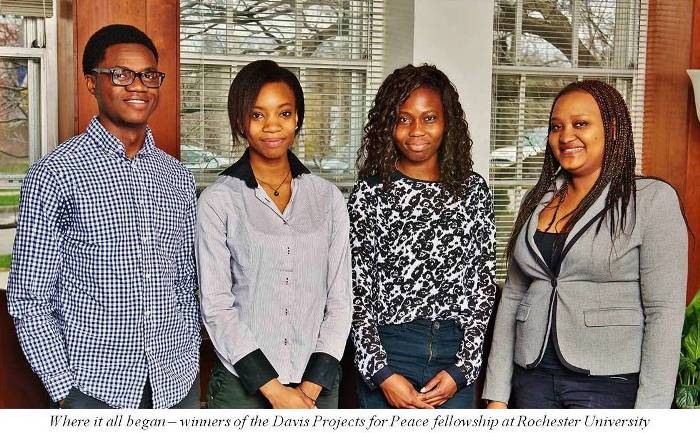News from Maison de la Gare
"A New Beginning for the Talibé Children"
Tweeter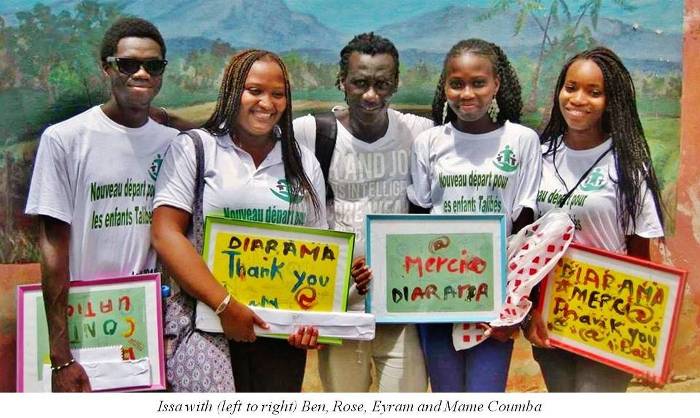
Fostering Understanding and Stopping Abuse - Davis Projects for Peace fellows make a difference
Four African students at the
University of Rochester, New York were selected in early 2015 to receive a grant from
Davis Projects for Peace. Rose Mbaye had witnessed first-hand in her hometown
of Dakar the extreme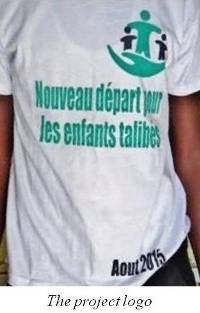 physical abuse and social marginalization of the begging
talibé street children. She shared her determination to do something about
this problem with her teammates at Rochester U., Mame Coumba Mbodji from
Senegal, Zanga Ben Ouattara from Burkina Faso and Eyram Adedze from Ghana and,
together, they received this prestigious award.
physical abuse and social marginalization of the begging
talibé street children. She shared her determination to do something about
this problem with her teammates at Rochester U., Mame Coumba Mbodji from
Senegal, Zanga Ben Ouattara from Burkina Faso and Eyram Adedze from Ghana and,
together, they received this prestigious award.
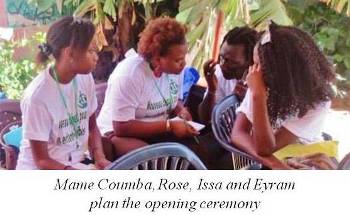
Rose reports that the group contacted several Senegalese organizations working
with the talibé street children, seeking both to understand the issues better
and to identify a partner whom they could work with to effect change in a short-term
project. They selected Issa Kouyaté and Maison de la Gare. From Issa's point
of view, "We had discussions about the feasibility of this project over
three long months. I shared the experience and ideas that have made Maison de
la Gare what it is, working in close collaboration with our partners and with
the world around us. 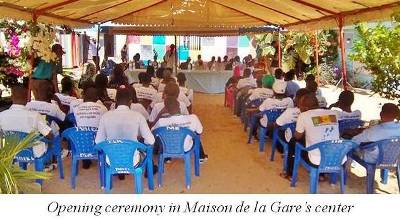 And I expressed my conviction that, to succeed in this
work, Maison de la Gare must work hand in hand with civil society and all of
the organizations that work for the protection of children."
And I expressed my conviction that, to succeed in this
work, Maison de la Gare must work hand in hand with civil society and all of
the organizations that work for the protection of children."
The main goals of the project were to promote awareness of the exploitation,
abuse and stigmatization of the talibé children, and to collaborate with
different local stakeholders to improve the conditions of material, educational
and psychological deprivation in which these children live. Beyond just
promoting empathy, the aim was to engage the children themselves, parents,
spiritual leaders, youth service organizations, educators, public officials
and ordinary citizens to take action for the betterment both of the children and
of society at large.
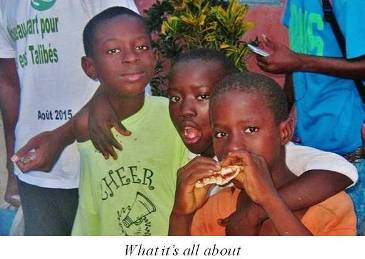
The project lasted from July 31 to August 26, 2015, and the team was
assisted by 45 Senegalese volunteers, mostly university students, who had been
recruited a few weeks earlier.
The activities planned during the four weeks included visits and clean-up of
seven of the daaras where the boys live, renovation of three of those daaras,
providing 18 vocational training workshops in gardening, pottery and artistic
recycling, organizing eight collections of clothes, shoes, soaps, etc. in
different locations around Saint Louis, and organizing awareness campaigns in
three different communities. The volunteers also led French, English and
basic computing classes as well as other educational activities and sports
competitions in Maison de la Gare's center. Volunteers were organized into
four groups, 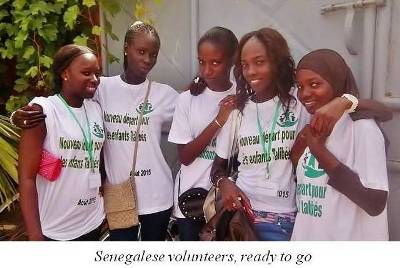 and each of these worked in turn on each of the activities.
This provided all of the volunteers with the opportunity to have an all-round
experience of the project, and this contributed to maintaining their interest
and commitment so that over 90% of them stayed for the full four weeks.
and each of these worked in turn on each of the activities.
This provided all of the volunteers with the opportunity to have an all-round
experience of the project, and this contributed to maintaining their interest
and commitment so that over 90% of them stayed for the full four weeks.
The activities were all a great success, and their completion was even more
satisfying. Rose, Ben, Mame Coumba and Eyram received positive feedback
about the project from marabouts, parents, the local media and other organizers.
Over 500 talibé children were touched by the programs at Maison de la Gare's
center and in their daaras. And the awareness campaign sensitized over 300
other stakeholders to the phenomenon of forced child begging, child abuse
and the associated stigmatization.
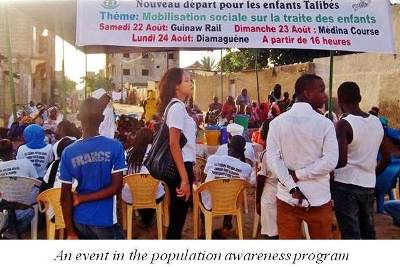
On their return to university, Eyram, Rose, Mame Coumba and Ben summarized
what they had learned:
"Through the conversations that we have had with different classes of
Senegalese people on the issue of the talibés, it has become clear that it
is human nature to refuse to take responsibility for social injustice.
Fingers are always pointed at the government as the agent to rectify this
issue. These conversations pushed us to think about our complicity in this
system; we can't help but wonder how much responsibility we have refused to
take on different issues in our lives and the lives of people around us.
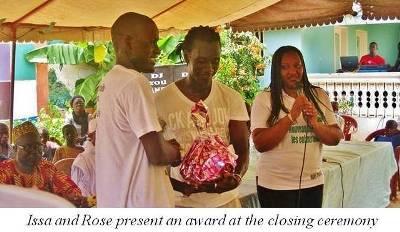
This project reminded us that it is essential to take charge of the
challenges we face in our lives. It takes a dedicated mind and heart to
tackle a problem as complex as the exploitation and abuse of child beggars
in Senegal. However, we believe that an idea, no matter how small, can make
a significant impact if properly empowered. We must never underestimate the
power of collaboration for a noble collective purpose, as the satisfaction
one gets from addressing social injustice is worth more than a thousand words."
As for Issa, he summarized the project this way: "This project gelled quickly
around all of the people involved ... Maison de la Gare, university students,
talibé children, Quranic teachers and the authorities. Thus was born 'A New
Beginning for the Talibé Children.'"
